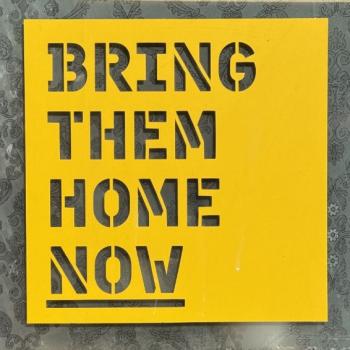Jesus said, “the poor you will always have with you” (John 12:8). Were you taught, as I was (continuing the thought from my last post), that when Jesus said this, he was merely stating a tragic fact? – maybe not to discourage us from helping the poor, but to spare us from false hope that we can eradicate poverty.
According to a Washington Post poll, 53% of white evangelical Protestants blame poverty on lack of individual effort, vs. only about 33% of atheists, agnostics, and the non-affiliated.
I used to think like a white evangelical (because I was one). I understood Jesus’ words, “the poor you will always have with you,” to be a commentary on the utter fallenness of the world, or possibly the persistence of laziness among humans (not including myself).
I recently learned that in these words, Jesus was quoting the beginning of a well-known passage from the Hebrew Bible. He was using shorthand – just like we would say, “I can do all things,” or “all things work together for good.” We know the whole verse from the first few words.
Jesus was referencing Deuteronomy 15:7-11.
“If among you, one of your brothers should become poor, in any of your towns within your land that the Lord your God is giving you, you shall not harden your heart or shut your hand against your poor brother, but you shall open your hand to him and lend him sufficient for his need, whatever it may be…For the poor you will always have with you in the land. Therefore I command you, ‘You shall open wide your hand to your brother, to the needy and to the poor, in your land.’”
Are you having an Aha moment? I did.
Rather than telling us that poverty will never end, Jesus was instructing us to keep giving – generously.
What can happen if followers of Jesus keep giving – generously? A passage from Acts gives us a glimpse:
And God’s grace was so powerfully at work in them all that there were NO needy persons among them. For from time to time those who owned land or houses sold them, brought the money from the sales and put it at the apostles’ feet, and it was distributed to anyone who had need. (Acts 4:34-35)
For this small community at least, poverty was eradicated. (IMHO, the passage actually sounds a lot like communism – the good kind, with trustworthy people in charge.)
Assumptions about poverty and the poor
It’s great to know what the Bible commands, but unless we deal with the attitude of our hearts, we won’t be joyfully obedient. As promised, let’s look at some common assumptions about the poor – especially the poor who ask for money or collect welfare. Those assumptions are:
- The poor are lazy and don’t want to work. AND/OR,
- They have lived irresponsibly and are now getting their just desserts. AND,
- If we help them, we will be encouraging them to remain in poverty, and they’ll never contribute to society. AND/OR,
- If we give them money, they’ll probably spend it on booze or drugs.
Let’s look at these assumptions one by one, and see whether they ring true.
(Commercial: if you question “business as usual” in Christianity – or want to question it – subscribe to my newsletter, and we can journey together!)

“The poor are lazy and don’t want to work”
Are you sure they’re lazy? Many folks work 2 or 3 jobs and are still poor. Others can’t get a job because they don’t have transportation, or child care, or skills. Some have physical or mental health issues (and no health care plan) that prevent them from working.
Some who can work have logical reasons – issues of survival – that have kept them out of the workforce (read some of them here). For a woman whose top priority is feeding her children, the potential cost of child care and transportation while she is at work, plus the loss of food stamps may force her to stay unemployed.
This is not belligerent refusal to work. This is a Catch-22, a system that is so dysfunctional that, instead of enabling people to rise out of poverty, it paralyzes them where they are.
The laziness stereotype can also carry racist overtones: “They don’t want to be contributing members of society. They are happy to live off of my hard work. They have no shame. I could never live like that.” Can you hear it?
If you really think some people enjoy being a burden on society, living in squalor – then you’re judging that group as less than you, lacking in nobility and humanity.
You also probably have no idea how precarious life is at the edge of poverty.
(Neither do I. But I’ve known people who do, and heard their stories. I’ve learned that people live one flat tire away from homelessness. If you want to learn a little something about this world, watch Maid on Netflix. It shines a light on poverty, domestic abuse, and the flawed welfare system.)
One more observation on laziness: some of the world’s wealthiest people are a burden on society. They don’t pay their share of taxes, they underpay their workers, and they have no shame in doing so. That’s gross.
“The poor have lived irresponsibly and are now getting their just desserts”
Christians, above all people in the world, ought to understand the evil of this statement. We have all lived irresponsibly, and we have been (undeservedly) given a second chance. We know what our “just desserts” would be if not for the Cross.
When Jesus fed the crowds, no one had to fill out a questionnaire first – Are you sure you can’t afford to pay for your own food? Have you used alcohol or illicit drugs in the last month? been sexually active? walked off a job? wasted your money? asked a relative to help you?
No, he just passed the food around until everyone had their fill.
“If we help the poor, we will be encouraging them to remain in poverty, and they’ll never contribute to society”
Again, if you think anyone wants to live in poverty, you are seeing them as somehow subhuman, and not grasping the difficulty of their situation.
We’re also ignoring Scripture:
“Suppose a brother or a sister is without clothes and daily food. If one of you says to them, “Go in peace; keep warm and well fed,” but does nothing about their physical needs, what good is it?” (James 2:15-16).
“If we give money to the poor, they’ll probably spend it on booze or drugs”
First off, not everyone who’s poor is an addict. Don’t stereotype.
That said, alcohol and drug addictions are real, and rob us of our common sense. If you see someone who is high and begging, they still need to eat. Give them food instead of money. Don’t be judgmental.
Poverty is associated with greater risk of addiction due to many factors, including very real feelings of fear, vulnerability, and powerlessness. We can’t say with certainty that we would stay clean under the same pressures.
And let’s keep in mind that middle class and wealthy people also waste money on booze and drugs (and other stupid things).
Jesus told us that when we care for the poor, in a way we’re caring for Jesus. That is, Imago Dei is there in the strung-out, the hung-over, the HIV-positive, as much as it is in us.
Other forms of help
There are lots of ways to help the poor besides giving money to panhandlers. Respectable charities need our generous donations; soup kitchens need our time. Some churches provide free meals, diapers, children’s books, or after-school activities in their neighborhood – volunteer your time and treasure there.
We know the saying, “give a person a fish, and he will eat for a day; teach him to fish, and he will eat for a lifetime.”
Programs that teach skills can pave the way to employment, which is great. But our system is so dysfunctional that employment is not a ticket out of poverty – and can actually make things worse. So while we need to support such programs, we need to also advocate for the thoughtful overhaul of the system (read a little about welfare reform here).
And let’s not forget that while learning to “fish,” people still need to eat. Keep a box of granola bars or some Walmart gift cards (or cash) in your car to help the needy in the moment.
See Jesus in them.
(If you are energized by challenges to the evangelical status quo like this, you’d enjoy my blog. Sign up for my free newsletter here!)
(If you would like to comment, please pop over to my Facebook page. All of my posts are there and open to constructive comment! I welcome your thoughts. And don’t forget to subscribe to my newsletter!)
YOU MIGHT ENJOY READING:
Where your treasure is: how would Jesus handle panhandlers?
Evangelicals and progressives: let’s dialogue about Jesus and poverty
Palestinians don’t just need peace – they need Just Peace
The (not so) secret message of the Good Samaritan
FEATURED IMAGE: “Poverty. Portland Oregon. March 2018” by drburtoni is licensed under CC BY-NC-ND 2.0













